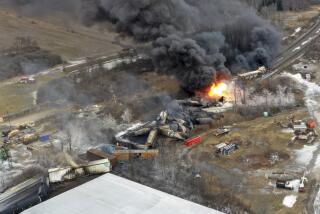Itâs Not Just a Matter of Counting Missile Warheads : American security is threatened more by economics than nuclear arms
Itâs important for America to get the cart back in front of the horse--that is, to plan first how to succeed in peace and second how to succeed in combat. It is too early to separate real from imagined threats in the still-seething Persian Gulf or the remnants of the Soviet Union, parts of it in flames. And it is too early to judge whether all (or any) of the potential trouble spots merit the weighing of a nuclear response, although skeptics note that allied air power subdued the Iraqi air force, the largest in the Middle East, with conventional weapons.
And so the recent Air Force proposal to downsize the U.S. strategic arsenal, welcome in theory, borrows too much from Cold War rhetoric, especially in its view that maintaining a nuclear arsenal will give the nation âprestige,â and borrows not enough from the basic lesson of the Cold War, which is that the world feared, not respected, nuclear arms. Is the world best left with a downsized system of nuclear deterrence based primarily on mass primal fear of instant devastation? Or is there a better way?
RED LIGHT ON PREDICTIONS: The most serious flaw in the Air Force prospectus for the new world order is that noted by Carl H. Builder of the RAND Corp. The world in which two huge nuclear arsenals held each other at bay is gone, so planning for the future must start elsewhere. âIt is no longer possible to project the future as an extension of the past,â he says. Itâs possible that has always been to some extent true; these days it seems truer than ever.
This probably applies to missile defenses on a Star Wars scale as well. Even at full budget levels, decades of research would be required to defend against launchings, say, from any outlaw nation among the former Soviet republics. And other potential nuclear enemies pose no foreseeable threat because they have yet to design both warheads and the missiles that could carry them across an ocean to the United States.
In any event, the question of whether the United States needs 4,000 or 5,000 missiles, as the Air Force proposes, or closer to 1,000, as a National Academy of Sciences committee suggests, is ensured full debate on Capitol Hill. What is less certain of full debate, except perhaps in the dangerous political rhetoric of âAmerica First,â is a clear plan for rebuilding the American economy and reshaping it to compete in the global markets of the new world order. Without that, even a stripped-down military force might be too big a burden for the country. The nationâs health-care system is in crisis. The recession not only makes capital hard to raise but weakens financial institutions themselves. The United States, a creditor nation mere years ago, now is a debtor nation. The education system sometimes seems as close to bankruptcy as some of our airlines.
Part of the problem is an ideological resistance to a governmental role in the market, although American automobile manufacturers showed little such resistance in Tokyo last week in letting Washington run interference for them on new sales in Japan. Federal policies have also blocked most efforts to invest public research and development funds in projects that would ultimately lead to production of goods for the global market.
GREEN LIGHT ON MARKETING: Yet some analysts argue that a certain amount of what opponents of such seed money call âpicking winners and losersâ may be the only way to compete in world markets with other countries whose governments do just that. A recent example is a decision by Japanâs Ministry of International Trade and Industry that the next big market worldwide will be for so-called âgreen technology,â the entire range of machines and devices for controlling air and water pollution. The normal follow-up for decisions like that is creating industrial consortiums and fashioning tax breaks to spur research and development.
With few exceptions, Washington shies away from such decisions, outside of defense research, and even there funds for research are monitored to make certain that defense applications of technology that results are primary and consumer uses run a poor second.
One promising exception is the federal governmentâs $100-million investment in a project shared by Detroitâs Big Three automobile manufacturers to build a better battery, the last breakthrough needed for electric cars to become a commercial success.
A true debate over whether such ventures are proper or whether there are other ways in which the federal government can or should help American manufacturers design and build products for the world market would be necessarily rancorous. Such a debate would make the coming debate over how many nuclear missiles the Air Force needs seem childâs play. The outcome also would tell a great deal more about how the United States will go about holding onto its rank as the last superpower.
More to Read
Sign up for Essential California
The most important California stories and recommendations in your inbox every morning.
You may occasionally receive promotional content from the Los Angeles Times.










